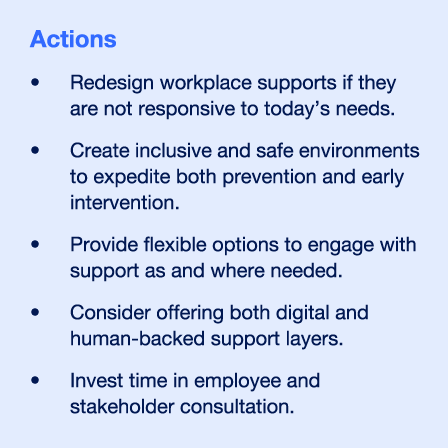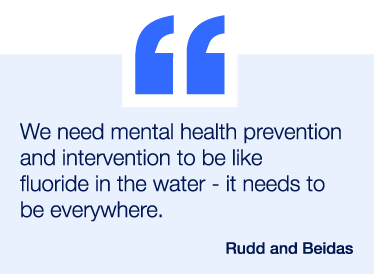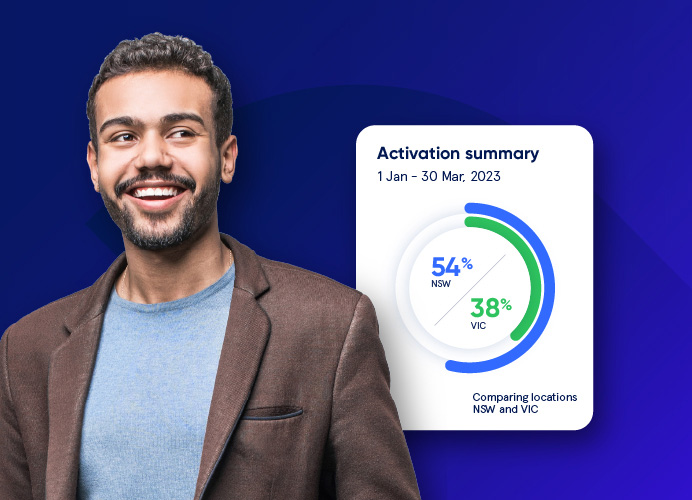Workplace mental health: right-fit solutions

Insights.
Low employee uptake of workplace mental health support has largely been accepted with minimal inquiry. But with this year’s release of ISO 45003 and the subsequent spotlight on workplace psychological health and safety, it’s time for organisations to ask why their employee support programs have as low as a five per cent uptake, as well as how they can enact their duty of care to meet contemporary employee demands.
Few employers review the relevance and effectiveness of their workplace support programs in a regular or timely manner. With this in mind, we recently joined with PwC Australia to explore why workplace mental health support programs have such a low uptake. Our report proposed the following three reasons:
- It’s not built into the culture;
- Solutions are not the right fit; and
- Poor past experiences.
This post shares an excerpt of the second reason – “solutions are not the right fit” – from our joint report, Rethinking workplace mental health and wellbeing.
Excerpt from our Sonder-PwC Australia report
This report explores three reasons for the low uptake of workplace mental health support.
Reason two: solutions are not the right fit
Many workplace mental health supports are still reliant on traditional EAPs and a one-size-fits-all model, despite a growing expectation for more contemporary services that are better suited to employee needs, modern job design, and industry challenges.
Modern offerings encourage proactive prevention and early intervention. They offer flexibility, professional support, and involve consultation with employees and stakeholders to redesign the whole experience to support people better.
Prevention and early intervention
Getting help early can have a significant positive impact on mental health. Yet, some workplace support programs focus only on crisis support. They act as safety nets for late stage mental ill health, rather than as enablers of wellness and good health.
A key element of early intervention is building trust. But it is not unusual for employees to distrust support services funded by their employer because they worry about their privacy and confidentiality being breached. Organisations need to provide a range of options that enable employees to select what is right for them. This includes having options that allow employees to remain anonymous when seeking help, guidance to find specific support (e.g. alcohol dependence) and practical ways to engage their manager and employer as part of this (e.g. how to have a conversation to ask for help at work).
Modern support programs create ways to build trust earlier in the health care journey. For example, via digital self- help tools, timely alerts and nudges, and invitations for employees to chat before they hit breaking point. These stepping stones can build trust gradually by providing a warmer and earlier path to help – facilitating better and more equitable outcomes.
Anytime, anywhere
Traditional support services require employees to phone and book a deep- dive appointment with a counsellor or psychologist. “This is the last thing that people needing mental health support feel like doing,” says Dr Jamie Phillips, Sonder’s Medical Director and Head of Member Support.
“Today’s tech-savvy generations prefer digital in the first instance because it is less confronting and is available when and where they need it. Ninety-one per cent of our members submit their initial enquiry via chat. Only nine per cent call us.”
Work environments are not the same. Construction and manufacturing workers for example, as well as frontline retail and health workers, find it difficult to leave their workplace to travel to in-person appointments. Working parents struggle as well, especially if they are temporarily homeschooling and have no other childcare options.
Employees in hybrid working environments also want the flexibility to access care whenever and wherever it’s needed, as well as a variety of entry points and channels to engage with support.
Web chat functions, web forums, and curated self-help content all offer flexible, easy ways for employees to reach out for support.

Professional help
Digital solutions offer enormous potential to provide initial guidance and help join the dots. However, most issues are multilayered and require health professionals to ensure robust clinical governance and escalation pathways are followed. Human support can more effectively identify, understand, and help manage these complexities for each individual over time.
“Around 51 per cent of Sonder’s support cases are caused by something other than the issue stated. For example, self-diagnosed financial stress, with further triage, might uncover a need for urgent safety support for domestic violence, plus mental health support for isolation, depression, and suicide ideation,” says Dr Phillips.
Hence why “digital interventions with the highest levels of engagement are those that include some form of human interaction,” say Rudd and Beidas from the Center for Mental Health, Department of Psychiatry, Perelman School of Medicine, at the University of Pennsylvania, Philadelphia.

Consultation
Fair Work Commission advice says that better decisions are made when employees have input. A right-fit workplace support program should consult employees and stakeholders to develop programs relevant for each organisation, workforce, industry, and operating environment.
For example, compared to benchmark groups, fly-in fly-out (FIFO) workers experience higher levels of psychological distress, burnout, drug and alcohol usage, suicide ideation, and poorer sleep quality. They are also more likely to experience or witness bullying in the workplace. These factors are important to consider when designing workplace supports in this industry.
Future of work frameworks suggest going beyond program consultation. Long-term workforce strategy should involve the co-creation of redesigned work experiences and supports, which are holistic, human centred and informed by lived experience.

Want to learn more?
To read the full Sonder-PwC Australia report, please click here. For more information about how Sonder can help you rethink your workplace support, we invite you to contact us here.
About Sonder
Sonder is an Active Care technology company that helps organisations improve the wellbeing of their people so they perform at their best. Our mobile app provides immediate, 24/7 support from a team of safety, medical, and mental health professionals - plus onsite help for time-sensitive scenarios. Accredited by the Australian Council on Healthcare Standards (ACHS), our platform gives leaders the insights they need to act on tomorrow's wellbeing challenges today.
Related posts
There's so much more to share
Sonder is reimagining health, safety and wellbeing support. Sonder proves human centric care leads to earlier intervention. Sonder impacts one person at a time to drive meaningful change across an organisation. Sonder understands people and how to support them.







